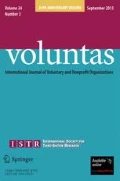Abstract
Under apartheid, there were an ever-increasing number of nongovernmental organizations (NGOs) concerned about challenging the South African state and furthering a nonracial democratic society. In the 1990s, with the transition to an African National Congress-led democratic government, these organizations underwent profound changes. This article describes the key dynamics of this process, outlines the challenges currently confronting the new NGO sector, and concludes that the prospects for progressive NGO work in dealing with the poor and marginalized are constrained by the prevailing neoliberal economic climate.
Similar content being viewed by others
REFERENCES
Advisory Committee (1997). Structural Relationships between Government and Civil Society Organisations, Report prepared for the Deputy President, Thabo Mbeki, South Africa.
Ashley, B., and Andrews, M. (1998, June 28). Warning: Handle with extreme caution. Reconstruct (supplement to The Sunday Independent [Johannesburg]), No. 17.
Bernstein, A. (1994). NGO's and a democratic South Africa. Development and Democracy, 7, 55-66.
Budlender, G. (1993). Overview: The legal and fiscal environment of voluntary organisations in South Africa. In A. M. Micon and B. Lindsnaes (eds.), The Role of Voluntary Organisations in Emerging Democracies: Experience and Strategies in Eastern and Central Europe and in South Africa, Danish Centre for Human Rights and Institute of International Education, New York, 85-91.
CASE (Community Agency for Social Enquiry) (1996). Tango in the Dark: Government and Voluntary Sector Partnerships in the New South Africa, Johannesburg.
Clayton, A. (ed.), (1996). NGOs, Civil Society and the State: Building Democracy in Transitional Societies, INTRAC, Oxford.
Currin, B. (1993). Summing up: Civil society organisations in emerging democracies. In A. M. Micon and B. Lindsnaes (eds.), The Role of Voluntary Organisations in Emerging Democracies: Experience and Strategies in Eastern and Central Europe and in South Africa, Danish Centre for Human Rights and Institute of International Education, New York, 165-170.
Habib, A. (1997a). From pluralism to corporatism: South Africa's labour relations in transition. Politikon, 24(1), 57-75.
Habib, A. (1997b). South Africa—the rainbow nation and prospects for consolidating democracy. African Journal of Political Science, 2(1), 15-26.
Habib, A., and Owusu-Ampomah, K. (1997). Report on the Institute for Democracy in South Africa (Idasa). Report prepared for the International Study of Peace Organizations—South Africa.
Hamber, B., Mofokeng, T., and Simpson, G. (1997, November 10). Evaluating the role and function of civil society in a changing South Africa: The Truth and Reconciliation Commission as a case study. Paper presented at The Role of Southern Civil Organisations in the Promotion of Peace seminar, Catholic Institute for International Relations, London.
Hellmann, E. (1979). Fifty years of the South African Institute of Race Relations. In E. Hellmann and H. Lever (eds.), Conflict and Progress: Fifty Years of Race Relations in South Africa, Macmillan, Johannesburg.
Jaster, R., and Jaster, S. (1993). South Africa's Other Whites: Voices for Change, Macmillan, London.
Kane-Berman, J. (1996). Leave well alone: The role of NGOs in the process of democratization. In H. Kotzé (ed.), Consolidating Democracy: What Role for Civil Society in South Africa? University of Stellenbosch and Konrad-Adenauer-Stiftung.
Korten, D. C. (1987). Third generation NGO strategies: A key to people-centred development. World Development, 15, 145-159.
Kraak, G. (1995). An INTERFUND briefing on development, education and training in South Africa in 1994/5. Development Update, Johannesburg.
Kraak, G. (1996). An INTERFUND briefing on development and the voluntary sector in South Africa in 1995/96. Development Update, Johannesburg.
Lazerson, J. (1994). Against the Tide: Whites in the Struggle Against Apartheid, Westview, Boulder, Colorado.
Lee, R., and Buntman, F. (1989). The Future of the NonProfit Voluntary Sector in South Africa, Research Report No. 5, Centre for Policy Studies, Johannesburg.
Mandela, N. (1996). Message from President Mandela on the occasion of NGO week, 2–6 December, Rand Afrikaans University, Johannesburg.
Mandela, N. (1997). Political Report of the President, Nelson Mandela, to the 50th National Conference of the African National Congress, Mafikeng, 16 December.
Marais, H. (1998). South Africa, Limits to Change: The Political Economy of Transformation, Zed, London.
Marks, S. (1998). Social change, order and stability in the new South Africa. In F. H. Toase and E. J. Yorke (eds.), The New South Africa: Prospects for Domestic and International Security, Macmillan, London, 17-36.
Naidoo, K. (1997). South African NGOs: The Path Ahead, CIIR, London.
Petras, J. (1997). Imperialism and NGOs in Latin America, Monthly Review, 49(7), 10-27.
Pilger, J. (1998). Apartheid Did Not Die. British television documentary.
Price, M. (1995). Some reflections on the changing role of progressive policy groups in South Africa: Experiences from the Centre of Health Policy. Transformation, 27, 24-34.
Southall, R., and Wood, G. (1998). Political party funding in Southern Africa. In P. Burnell and A. Ware (eds.), Funding Democratization, Manchester University Press, Manchester, 202-228.
Spink, K. (1991). Black Sash: The Beginning of a Bridge for South Africa, Methuen, London.
Taylor, R., Egan, A., Habib, A., Cock, J., Lekwane, A., and Shaw, M. (1998, July 8–11). Final report: International study of peace organizations—South Africa. Presented to the 3rd International Conference of the International Society for Third Sector Research, University of Geneva.
Taylor, R., Cock, J., and Habib, A. (1999). Projecting peace in apartheid South Africa. Peace & Change, 24(1), 1-14.
Turok, B. (1996). Why are NGOs struggling? Mail & Guardian [Johannesburg], Nov. 29–Dec, 5.
Walters, S. (1993). Continuity and change in community organisations: Trends in Greater Cape Town from 1989 to 1991. CORE Working Paper No. 1, University of the Western Cape.
Author information
Authors and Affiliations
Rights and permissions
About this article
Cite this article
Habib, A., Taylor, R. South Africa: Anti-Apartheid NGOs in Transition. VOLUNTAS: International Journal of Voluntary and Nonprofit Organizations 10, 73–82 (1999). https://doi.org/10.1023/A:1021495821397
Issue Date:
DOI: https://doi.org/10.1023/A:1021495821397




